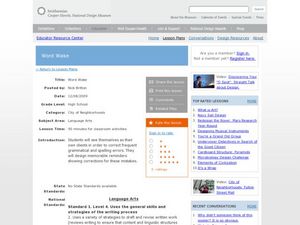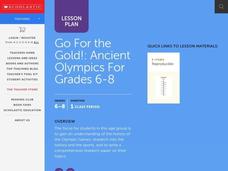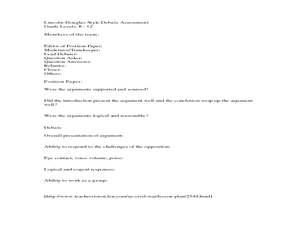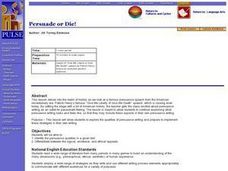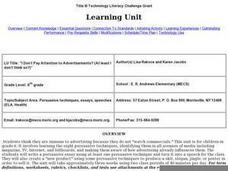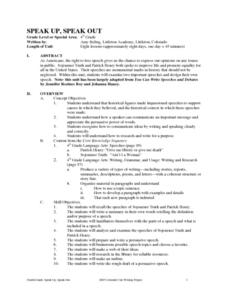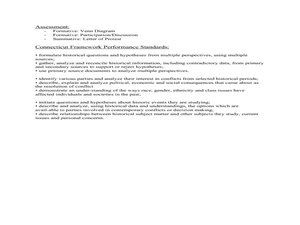Curated OER
The Aftermath of War
Students share their opinions on the war in Iraq. After reading an article, they identify the thoughts of President Bush on the conflict. In groups, they share their opinions for and against current United States policy in Iraq and the...
Curated OER
Communication and Social Networks
Pupils work in cooperative groups to explore communication needs of our world. They are assigned a demographic area and asked to create ways to solve communication problems with innovative ideas. They also explore areas that can help...
EngageNY
Grade 11 ELA Module 2: Unit 1, Lesson 21
Is there power in persuasion? After reading paragraphs six and seven of Booker T. Washington's "Atlanta Compromise" speech, learners look at how Washington uses rhetoric and carefully planned word choice to add to the persuasiveness of...
Curated OER
Connotation in Propaganda
High schoolers assess persuasive techniques in propaganda. They identify and critique rhetorical devices in primary source documents (sources are not specified, but links to sites that contain various documents are included). Groups make...
Curated OER
The City Life or the country Life: conventions: Comparative and Superlative Forms of Adjectives and Adverbs
Reinforce knowledge of adjectives and adverbs by game playing. To better understand English conventions young writers, use flashcards to identify the base word and its comparative or superlative form.
Curated OER
Word Wake
Put your common writing errors to rest with this resource, which prompts high schoolers to create eulogies and tombstones for overused and incorrect words. They work on correcting common errors in spelling and usage mistakes in their own...
Curated OER
Words and Pictures Connect Nature and People: The American Conservation Movement
Students research some of the men and women who help to raise the environmental consciousness of the American people through their writings and drawings. They write a persuasive piece about an outdoor place which will connect their...
Curated OER
Go For the Gold! For Grades 3-5
Students use web technology to investigate ancient Greece and the Olympic Games. They explore the history of the Olympics. Students make connections between Greek and English. They make and record a persuasive speech and write a...
Curated OER
Go For the Gold!
Students are introduced to the history of Greece and the Olympic Games and then research the history and sports in order to write a research paper. They make connections between the 2004 Olympics and the past Olympic Games and interpret...
Curated OER
Author's Day
Have your learners choose an author to study. One resource link gives a list of approved authors. Scholars read at least three works produced by that author and produce three separate book reports as well as a two-page author report....
Curated OER
Classroom Lincoln-Douglas Debate
Unfamiliar with the Lincoln-Douglas Debate format? Check out this resource that details the procedures of the debate, the roles and responsibilities of each participant, and the timing of each round.
Curated OER
Persuade Me
Seventh graders give persuasive presentations based on the questions they have researched. They examine appropriate delivery techniques for effective persuasive presentations. (Note: This instructional activity should be taught, after...
Curated OER
Forms Of Knowledge
Students put writing pieces into categories to show different organizational features in writing. In this writing lesson plan, students are shown examples of speeches, poems, editorials, cartoons, parodies, historical fiction, and more.
Curated OER
Land, Liberty and the Struggle for the American Dream
Students investigate equality by reading a historical fiction book in class. In this civil rights lesson, students read the story Roll of Thunder, Hear my Cry with their classmates and define the Jim Crow Laws that kept blacks...
Curated OER
Seventeenth Century Pick-up Lines
Students analyze passages from The Mysteries of Love and Eloquence, or the Arts of Wooing and Complementing, written in the seventeenth century. Students analyze the images, words and figures of speech the author used and compare the...
Museum of Tolerance
The Pursuit of Democracy and Diversity: The Trial of Pro-Social Injustice in Historical Documents and Accounts
Class members investigate The Indian Removal Act of 1830, U.S. Theft of Mexican Territory Timeline, and President Abraham Lincoln’s letter to Horace Greeley, 1862, and then conduct a mock trial of each of these documents to determine...
Curated OER
Persuade or Die!
High schoolers read Patrick Henry's speech. They review prior learning about persuasive writing, and the American revolutionary war. Students listen as the teacher reads Patrick Henry's speech aloud to the class using lots of emotion and...
Curated OER
I Don't Pay Attention to Advertisements
Sixth graders examine the eight persuasive techniques, identifying them in all avenues of media including magazine, TV, Internet, and billboards, and making them aware of how advertising already influences them. They write an essay using...
Curated OER
Solving Science Mysteries
Students choose a science-related mystery to investigate such as the Loch Ness Monster or Bigfoot. They, in groups, research theories and give a persuasive talk presenting the theory they feel to be most likely.
Curated OER
Colonial North Carolina
Students resarch people and events from a given list. Then based on teacher options, students employ perspectives, an audience, a presentation format, and topic to prepare a two-page document to share with the class. Students also...
Curated OER
Speak Up, Speak Out
Fourth graders examine, compare, and summarize the speeches of Sojourner Truth and Patrick Henry. They review the parts of a good speech and design and give their own speech that expresses an opinion and persuades the listener..
Curated OER
The Enemy that Never Was
Students write speeches explaining why Japanese Canadians were not a threat to Canada during World War 2. In this Japanese Canadians lesson plan, students learn about racism, and how the Japanese were targeted but not a threat during the...
Curated OER
Martin Luther King, Jr. vs. Malcolm X
Eleventh graders compare and contrast the visions of Martin Luther King, Jr. and Malcolm X. In this African-American history lesson, 11th graders read speeches by each of the men and summarize the arguments made by each of them about...
Curated OER
The Enemy that Never Was
Students conduct research and explain in a speech why Japanese Canadians were not a threat to Canada during the Second World War.





